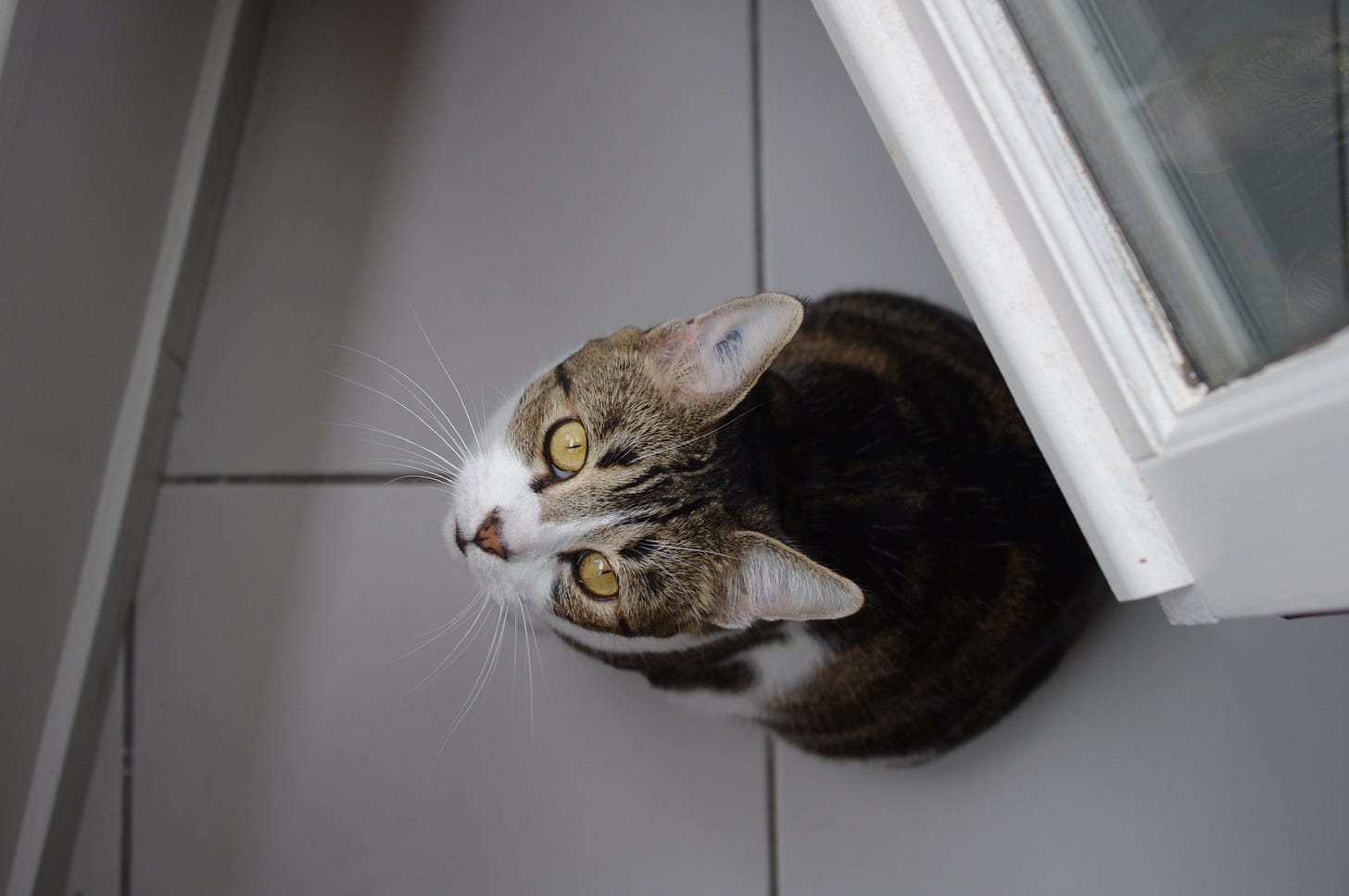June 2023 newsletter
Things I've done, read, liked, and things I'll be doing
It’s been a while.
In this newsletter I talk about recent professional news, running, and things I’ve read.
Professional news
First, the big news, which by now isn’t exactly a secret: I’m moving to Charleston, South Carolina, to take a new position as Assistant Professor in the Philosophy Department at the College of Charleston. Go Cougars! Yes, this has to do with what happened at New College, but also with the fact that this is a great opportunity. New city, new house, new colleagues, new friends, new running routes, new birds, new plants. I’ll miss New College, Sarasota, and Florida, but as I explained here, this is the right move. I may weigh in on the whole New College situation in depth later. In the meantime, you can read my interview for The Point.
In the last few months, I was lucky to get two articles accepted for publication:
“Relational nonhuman personhood”, forthcoming in Southern Journal of Philosophy
This paper defends a relational account of personhood. I argue that the structure of personhood consists of dyadic relations between persons who can wrong or be wronged by one another, even if some of them lack moral competence. I draw on recent work on directed duties to outline the structure of moral communities of persons. The upshot is that we can construct an inclusive theory of personhood that can accommodate nonhuman persons based on shared community membership. I argue that, once we unpack the internal relation between directed duties, moral status, and flourishing, relations can ground personhood and include nonhuman animals.
“Letting animals off the hook”, forthcoming in Journal of Ethics and Social Philosophy
A growing literature argues that animals can act for moral reasons without being responsible. I argue that the literature often fails to maintain a clear distinction between moral behavior and moral agency, and I formulate a dilemma: either animals are less moral or they are more responsible than the literature suggests. If animals can respond to moral reasons, they are responsible according to an influential view of moral responsibility–Quality of Will. But if they are responsible, as some argue, costly implications must be acknowledged. If, however, they should not be considered responsible, then we may have to reassess the meaning of animal morality. I discuss ways to eschew responsibility or to tailor it to animals and argue that each requires a revised conception of animal morality.
I also presented a version of my working paper, “Agential Value,” at a workshop on Welfare Across Species at the Paris School of Economics. I talk about the paper and other issues on the Sentientism podcast.
As I note in the interview with Jamie, my work has shifted toward a greater focus on agency over the years. Animal agency will be the topic of my book project. It will address foundational issues on moral status, animal minds, and action theory, as well as practical issues including animal morality, animals in sports, animal labor, animals in captivity, urban environments, and wild animal welfare.
Finally, there’s a book launch event for The Ethics of Animal Shelters (2023, Oxford University Press), for which I wrote a chapter on death and co-authored guidelines and recommendations.
On June 28th 2023, 10 am–1 pm (EDT) you are invited to join us online in celebrating the publication of The Ethics of Animals Shelters (2023, OUP), edited by Valéry Giroux (Centre for Research in Ethics), Angie Pepper (University of Roehampton), and Kristin Voigt (McGill University).
This edited volume addresses some of the many ethical challenges facing those who work tirelessly rescuing, rehabilitating, and rehoming animals in need. The book, which is the outcome of a collaboration between a group of ethicists and the Montreal SPCA, offers practical recommendations to those managing and working in animal shelters and examines the philosophical underpinnings of those recommendations. Topics covered include adoption policy, euthanasia and non-euthanasia killing, medical decision-making, shelter animal diets, and shelters’ role in transforming social norms and attitudes.
The launch event will involve a brief introduction to the project and the book by the volume editors and Me Sophie Gaillard who is Director of Animal Advocacy and Legal and Government Affairs at the Montreal SPCA. This will be followed by a series of critical reflections presented by Lori Gruen (Wesleyan University), Karen Heistand (Royal Veterinary College), and Jessica du Toit (Western University), and responses by the volume contributors. The event will conclude with a general Q& A session.
The event is free and open to all. Register here to receive the Zoom link.
OUP is offering a 30% discount code AAFLYG6 on the book here.
Running
[CW: what follows is a boring report of a DNF at an ultramarathon]
Running has been going on and off. I had signed up for the Cruel Jewel 100, which I finished last year in a little over 33 hours. I trained reasonably well for it though, as is almost always the case with me, I prefer coming 10% undertrained over 1% overtrained. Training aside, you can’t control everything. I caught a cold less than two weeks before the race. It’s not terrible timing since it coincides with tapering. But it might have left me with residual fatigue. Anyway, I started the race quite fresh and felt great for the first 30 miles or so.
Foolish me. I must have started too fast (owing to the course reversal, the first third of the race is relatively runnable now) and recklessly ignored that I had just recovered from a cold and would need to eat a lot more if I wanted to keep up with the effort. Then the proverbial stuff hit the fan. It felt increasingly difficult to get calories down, and then I tripped, fell, and rolled. Just a little scare, not hurt. But the situation hardly got any better. A bit later I fell again, this time hitting my chest with my poles and getting a lot more shocked than the first time. My sternum and my back hurt just running and breathing. It was more or less okay, but here’s the thing. I didn’t feel like eating and I knew I would fall again, and next time might be bad (I’m lucky I didn’t hit my head on a rock the first two times). And so, at the next aid station I was intent on dropping out. Except they wouldn’t quite let me—I would basically have to wait there for the remainder of the race (a long time) since there was no crew access. They tried to talk me into giving it another try. I popped an ibuprofen for the chest pain, had some veggie stock and pretzels, sat for a while texting my wife, and then got back on my feet to the next aid station (7ish miles). I felt much better and thought, ‘I’m finishing this thing!’. But then before the aid station, I started feeling down again. I said I wanted to drop again. They replied I didn’t want to drop there again (no crew access). And so I pushed through the next aid station, another 5ish miles ahead, roughly the 48-mile mark, a little before the turnaround point—that’s nearly an extra 13 miles, including the most brutal climbing section, since my initial drop-out attempt. No one there tried to talk me out of it. I would just have to wait. And I did wait a handful of hours, shivering on a camping chair in the middle of the night until I and two other DNFs could hop on a truck with a volunteer. I’ll spare you the details but it took us many hours to get to the start line where we could get to our cars and leave. Still, we had a great time with one of the RDs, who can’t be thanked enough.
Oddly enough, if you’ve read the report, I think I want to sign up again for next year. With proper training and a bit of luck, I can probably get closer to 30 hours. See you next year, Cruel Jewel, for more miles and pickle juice.

In other, disproportionately more impressive running news, if you have not heard of Courtney Dauwalter’s incredible performance at this year’s Western States 100, check out iRunFar’s coverage. Yes, maybe the weather helped, but let that sink in: Dauwalter destroyed Ellie Greenwood’s 2012 course record (16:47), which was itself an impressive improvement over Ann Trason’s long-standing record. Dauwalter’s 15:29 finish is 78 minutes faster Greenwood’s best. She finished in times that would have had many men win the race in most years. Second place Katie Schide finished in 16:43, also under the former course record. Simply mind-blowing.
Dauwalter completely shattered the record books and set a new standard that is likely to last for a lifetime.
Things I’ve read and enjoyed, in no particular order
Good for a Girl: A Woman Running in a Man’s World, by Lauren Fleshman.
Accomplished middle distance runner Fleshman’s memoir is also an important reflection on sexism in running, and how a sport shaped by men for men harms girls and women.
Not the most beautiful prose, a little facile on the politics, but overall a great read. 9/10 recommend.
Disappearing Earth, a novel by Julia Philipps
“One August afternoon, on the shoreline of the north-eastern edge of Russia, two sisters are abducted. In the ensuing weeks, then months, the police investigation turns up nothing. Echoes of the disappearance reverberate across a tightly woven community, with the fear and loss felt most deeply among its women.” (Goodreads)
Beautiful. 10/10 recommend.
The Sweet Spot: The Pleasures of Suffering and the Search for Meaning, by Paul Bloom
I love Paul Bloom. He’s such a delightful writer—clear, fun, smart, and elegant. Bloom’s argument echoes some of my thoughts about suffering and meaning in “Strangers to ourselves” (no, no one plagiarized anybody!). If, like me, you don’t believe hedonism is a good theory of our psychology or of the good life, check it out. 10/10 recommend.
Patrick Butlin, “Reinforcement learning and artificial agency”, Mind & Language
Abstract: There is an apparent connection between reinforcement learning and agency. Artificial entities controlled by reinforcement learning algorithms are standardly referred to as agents, and the mainstream view in the psychology and neuroscience of agency is that humans and other animals are reinforcement learners. This article examines this connection, focusing on artificial reinforcement learning systems and assuming that there are various forms of agency. Artificial reinforcement learning systems satisfy plausible conditions for minimal agency, and those which use models of the environment to perform forward search are capable of a form of agency which may reasonably be called action for reasons.
Of course, I like it because it meshes with some claims I make in “Agential value,” but mostly because it’s a careful, informative, and compelling argument for attributing at least some form of agency to some AIs. It’s open access, so check it out! Now, it’s still technical philosophy, and I guess I would have liked to hear more about the implications of the view. Still, 9/10 recommend.




